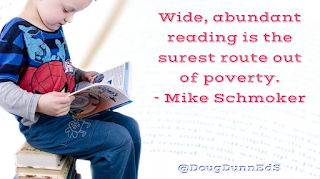Vicki Davis, “The Cool Cat Teacher,” once shared the following on social media:
- Nearly 85% of the juveniles who face trial in the US juvenile court system are functionally illiterate.
- More than 60% of all US inmates are functionally illiterate.
- 53% of 4th graders admit they read recreationally “almost every day” while only 20% of eighth graders say the same.
- Teenage girls between 16 to 19 who live at or below the poverty line and have below average literacy skills are six times more likely to have children out of wedlock than girls their age who read proficiently.
So, I challenge you to look at reading differently. It isn’t a standard. It is an essential to living a better life. When you help a child become a better reader, you are helping them live a better life.
I have written previously about the importance of literacy and hiring teachers who are passionate about literacy instruction. Both are extremely important. When Mike Schmoker says “Wide, abundant reading is the surest route out of poverty,” there is an abundance of research supporting his claim.
It is imperative we reach students early and often. Phonics instruction is critical. But, we can’t stop there.
In his book Leading with Focus, Schmoker says “Research shows that the acquisition of knowledge and vocabulary through content-rich curriculum may be more important to reading than any other factor.” This research should impact the way we view literacy instruction. We are all literacy teachers and should be teaching literacy through our specific content areas.
In my first week at a new school, I observed multiple teachers infusing their own personal reading passions into their classrooms. This must also be a regular occurrence across grade levels and content areas if we’re going to make a huge dent in the statistics above.
We can’t instill a love of literacy into others if we don’t have the passion ourselves.
It begins with us. I agree with Donalyn Miller when she says, “Being a master reading teacher begins with being a master reader.” We must model lifelong learning through reading.
As teachers, we should all strive to be master reading teachers by combining personal reading passions with a curriculum that is rich in content and vocabulary.
If we’re in the business of changing lives, few things will have the impact we desire like changing the way many of us view literacy instruction.
Doug Dunn is currently athletic director and junior high principal for the Licking (MO) School District. He has previously served as a K-8 superintendent and elementary principal. Doug can be found on Twitter at DougDunnEdS.

